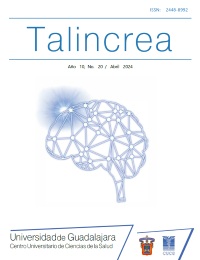Número actual
Language
Information
TALINCREA, año 10, No. 20, abril-septiembre 2024, es una publicación semestral editada por la Universidad de Guadalajara, a través del Departamento de Psicología Aplicada, por la división de Disciplinas para el Desarrollo, Promoción y Preservación de la Salud del Centro Universitario de Ciencias de la Salud. Sierra Mojada 950, Col. Independencia, 10585200, ext. 33611, http://www.talincrea.cucs.udg.mx, rogelio@cucs.udg.mx, editor responsable: Rogelio Zambrano Guzmán. Reservas de Derechos al Uso Exclusivo 04-2017-051511052200-203, ISSN: 2448-8992 , otorgados por el Instituto Nacional del Derecho de Autor. Responsable de la última actualización de este número: Coordinación de Tecnologías para el Aprendizaje, Centro Universitario de Ciencias de la Salud, Sierra Mojada 950, Col. Independencia, Guadalajara, Jal. Unidad técnica responsable del levantamiento electrónico: Mtro. Maldonado Rodríguez. Fecha de la última modificación 30 abril 2024. Las opiniones expresadas por los autores no necesariamente reflejan la postura del editor de la publicación. Queda estrictamente prohibida la reproducción total o parcial de los contenidos e imágenes de la publicación sin previa autorización de la Universidad de Guadalajara.





